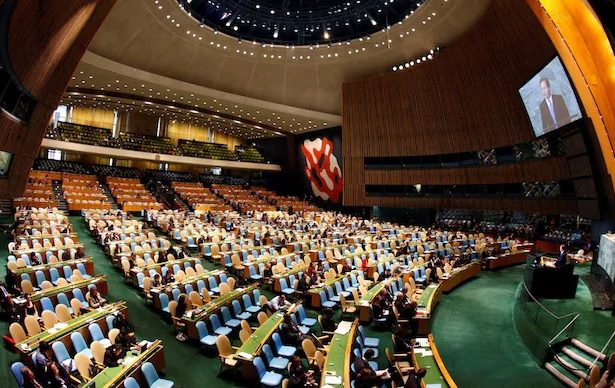India Abstains from UN Resolution: In a significant diplomatic move, India abstained from voting on a recent United Nations General Assembly (UNGA) resolution demanding that Israel end its occupation of Palestinian territories. This resolution, which called for Israel to cease its “unlawful presence” within 12 months, received overwhelming support with 124 votes in favor, 14 against, and 43 abstentions, including notable countries such as Australia, Canada, Germany, and the United Kingdom.
The Context of the Resolution
The resolution, titled “Advisory Opinion of the International Court of Justice on the Legal Consequences Arising from Israel’s Policies and Practices in the Occupied Palestinian Territory, including East Jerusalem,” highlights the ongoing tensions in the region. It accuses Israel of committing “wrongful acts” that violate international law and urges immediate action to rectify these breaches. The resolution underscores the international community’s responsibility to address violations of law that threaten regional and global peace.
The Palestinian representative to the UN emphasized the urgency of the situation, stating, “The international community cannot look away while international law is repeatedly violated.” This sentiment echoes the frustration felt by many within the international community regarding Israel’s policies in occupied territories.
Key Players and Their Positions
Among the nations that abstained, India’s position is particularly noteworthy. Countries like Australia, Canada, Germany, Italy, Nepal, and Ukraine also chose not to vote, indicating a cautious approach to a highly sensitive issue. On the opposing side, Israel and the United States rejected the resolution outright, arguing that it could exacerbate tensions in the region rather than contribute to peace.
Israel’s ambassador to the UN, Gilad Erdan, dismissed the resolution as a politically motivated effort aimed at undermining Israel’s legitimacy. Meanwhile, the US voiced concerns, stating that such resolutions would not facilitate dialogue or peace efforts.
India’s Diplomatic Stance
India’s abstention reflects its complex foreign policy, which seeks to maintain strong relations with both Israel and Arab nations. Historically, India has balanced its support for Palestine with a growing partnership with Israel, particularly in defense and technology. This nuanced approach allows India to navigate the intricacies of Middle Eastern geopolitics while asserting its position as a leader in the Global South.
Implications for Regional Peace
The resolution’s passage, despite significant abstentions, illustrates the international community’s continued concern regarding Israel’s actions in Palestinian territories. Critics argue that Israel’s ongoing settlement expansion and military presence undermine the prospects for a two-state solution, a concept widely supported as the foundation for lasting peace in the region.
The UN resolution serves as a reminder of the pressing need for dialogue and negotiation. It calls for all parties involved to engage in constructive discussions aimed at resolving longstanding grievances and fostering mutual understanding.
India’s abstention from the UN resolution on Israel’s occupation of Palestine underscores its delicate balancing act in international relations. As global dynamics shift, India’s role as a mediator and advocate for peace becomes increasingly crucial. The ongoing situation in the Middle East demands a multifaceted approach, one that considers the historical context, the aspirations of both Palestinians and Israelis, and the broader implications for global stability.
As the international community continues to grapple with this complex issue, the need for cooperative efforts and a renewed commitment to peace remains paramount. India’s position reflects its commitment to fostering dialogue while navigating the intricate web of alliances and interests that define its foreign policy. In a world where diplomatic relations are often tested, India’s careful maneuvering could play a pivotal role in shaping the future of peace in the region.


